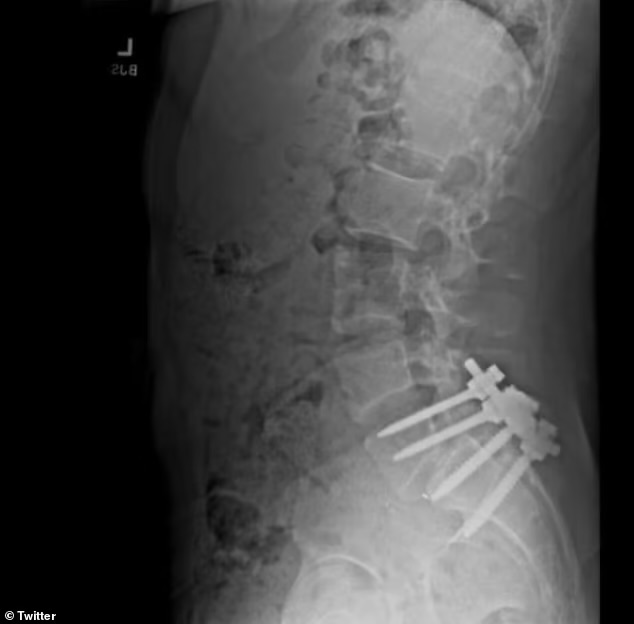A pain in the back
The alleged shooter of a major healthcare insurance company’s CEO posted complaints about his back pain and fusion surgery before allegedly (we live in a country of innocence until guilt by trial) shooting someone perceived to be in power.
Murder is immoral. I was lucky to believe that at a young age; more specifically, people I fought in combat were lucky that my values were so deeply ingrained that no amount or duration of pain and suffering would change that. I served seven years before accepting an honorable discharge. 35 years later, the VA rates me as a 65% disability, mostly for back pain secondary to combat injuries and parachuting accidents. I’m lucky to have VA healthcare, so I don’t have to worry about insurance companies, but I can still see the frustration in millions of Americans trying to navigate a frustrating system; and of course I can imagine the needless suffering of a murder victim’s family and lament the loss of a life; as the poem goes, “Each man’s death diminishes me, for I am involved in mankind. Therefore, send not to know for whom the bell tolls, it tolls for thee.”
When I was in graduate school for biomedical engineering with a focus on spine biomechanics and medical devices, it was 1997 and te FDA had just downgraded Class III spine fusion cages (difficult to market) to Class II (easier to market); almost immediately, annual cases of measurable spondylolisthesis (a slip of one vertebra relative to another, seen in the alleged shooter’s x-ray) skyrocketed from around 38,000 cases per year with no device reimbursed to more than 150,000 cases per year. Today, the spinal market is well over $4 Billion and growing with a seemingly endless supply of Class II options that have almost no long-term followup or government oversight; the closest thing we have is a lackluster congressional committee looking into physician financial motivation secondary to corporate funding or royalties, and because of physician-owned spine implant companies.
Many, if not most, physicians are well-intended; but they’re human and susceptible to biases. My grduate advisor, a spine surgeon and representative of the FDA, is one of an estimated 5% of surgeons not receiving perks or funding from corporations. He funded my graduate research “to know what we’re doing to these people.” Our work, and many like it, have been published again and again, yet our biases remain. In times like this, humanity could benefit from a long-term process that overrides our short-term nature.
Seventy years ago, soon-to-be president John F. Kennedy received the same surgery and practically the same implants as today’s alleged shooter. He suffered from chronic pain, even after the surgery, but had a small army of physicians, physical therapists, and mental coaches to help him persevere and focus on bigger things than himself. His conclusion was shown in the last bill he signed was a mental healthcare act, intended to create 1,500 walk-in clinics across America and address the deeper diseases of America; ironically, he was shot and killed three weeks later, allegedly by a veteran with a history of mental illness, and in typical politics our short-term elected officials have continued to defund mental healthcare, and Kennedy’s last act faded into history. Today, we’re still dealing with the deeper disease.
Randomized, double-blinded clinical research continues to shot that chronic pain, especially back pain, leads to depression, lost economic output, staggering healthcare bills, and taxpayers contributing almost half of all taxes to an untamed bureaucracy. I’m unsure if a transient leader or slick-sounding bill will change that; perhaps we should focus on the process with a long-term vision, like the one President Kennedy championed, that addresses the quality of life of patients and wise use of taxpayer funding to solve the root of things like chronic pain, isolated or ostracized patients, and ignorance in what does or does not warrant surgical intervention. It would have to be a long-term goal with measurable data fed back into a plan, which humans are notoriously bad at, but a government system and transparent data could override that and make things like double-blinded randomized clinical trials common vernacular for all patients looking for solutions to their pain, rather than blindly following biases that haven’t worked since at least Kennedy’s time.
We don’t check to see who the CEO of Apple is before buying an iPhone, because we trust their process. An effective company aligns budgets of each department to match a bigger goal. Medical devices must, by law now, follow a process of continuous improvement based on real-world data (though surgeons can still do what they wish – within insurance limits and healthcare ethics – because of many complicated reasons, but if history has taught us anything, it’s that human nature requires laws to override; from slavery to suffrage to child work laws, progress obvious in hindsight has been resisted by a democracy that must, by definition, align with at least half of voters who are so caught up in biases and short-term challenges that they don’t see the future.
All change starts with intention. In an elected democracy, perhaps our intention should begin with long-term visionaries who campaign on a process of continuous improvement rather than a cult of personality. Real power, like Kennedy saw, was in a big picture service to the masses, but only if the processes outlive the people.

